
News
Behind the Headlines
Two-Cents Worth
Video of the Week
News Blurbs
Articles
Testimony
Bible Questions
Internet Articles (2015)
Internet Articles (2014)
Internet
Articles (2013)
Internet Articles (2012)
Internet Articles (2011)
Internet Articles (2010)
Internet Articles
(2009)
Internet Articles (2008)
Internet Articles (2007)
Internet Articles (2006)
Internet Articles (2005)
Internet Articles (2004)
Internet Articles (2003)
Internet Articles (2002)
Internet Articles (2001)

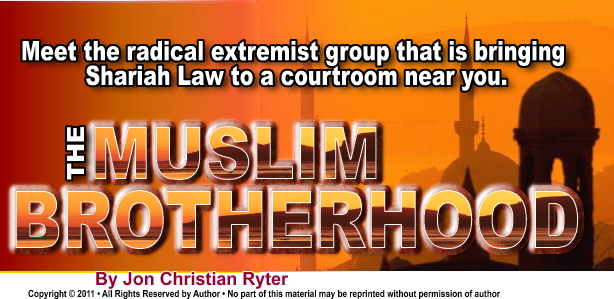
![]() t
was on Jan. 29, 2011 that a radical anti-Jewish Muslim group which calls
itself the Answer Coalition held an anti-Hosni Mubarak protest
outside of Barack Hussein Obama's temporary abode at 1600 Pennsylvania
Avenue in Washington, DC. Since it appeared to be just one more idiot
protest in the nation's capital, not too many beltway-and-beyond spectators
paid much attention to it. There were just too many homegrown economic
problems here to worry about without getting entangled in the family feuds
of the feudal lords of the Mideast. Particularly since anyone in America
who has spent five minutes studying Islam know there is no such thing
as independent, freethinking freedom in Sharialand.
t
was on Jan. 29, 2011 that a radical anti-Jewish Muslim group which calls
itself the Answer Coalition held an anti-Hosni Mubarak protest
outside of Barack Hussein Obama's temporary abode at 1600 Pennsylvania
Avenue in Washington, DC. Since it appeared to be just one more idiot
protest in the nation's capital, not too many beltway-and-beyond spectators
paid much attention to it. There were just too many homegrown economic
problems here to worry about without getting entangled in the family feuds
of the feudal lords of the Mideast. Particularly since anyone in America
who has spent five minutes studying Islam know there is no such thing
as independent, freethinking freedom in Sharialand.  But,
it's also a safe bet that almost no Americans—even those who were
watching the protests in Egypt and who knew that Mubarak's family
had fled Egypt three days before—realized this was an omen of very
bad things to come.
But,
it's also a safe bet that almost no Americans—even those who were
watching the protests in Egypt and who knew that Mubarak's family
had fled Egypt three days before—realized this was an omen of very
bad things to come.
They should have. Not only should it have told them that there was real trouble brewing in Egypt, but anyone following the dots should have run across the Muslim Brotherhood in their quest to learn who, or what, the Answer Coalition really was since the DC protest was organized by the Muslim Brotherhood. The Muslims used the stage to warn the US news media that the unrest in Tunisia and Egypt would spread across the entire Mideast—and the protesters would topple Arab governments that are currently allied with the United States.
Egypt was phase two of what the Muslim Brotherhood actually reiterated during the Washington protest that those behind the protests would overthrow every pro-western Muslim government in the Mideast. The US government, through the Kenyan-born, Indonesian-raised interloper in the White House who favors Islam, failed to hear the message, or ignored it. He chose, instead, to champion the anti-American protests from the podium of the Oval Office as a "democracy movement" in the Mideast. Following the lead of the White House, the mainstream media did the same. Especially when the fluid "democracy protests" flowed into Libya and it appeared to those who are accustomed to being told what they believe, that freedom-minded civilians were attacking the Islamofascist government of Muammar Muhammad al-Gaddafi. The media, of course, hyped it as a good thing. It may well prove, in the long run for the non-Muslim world, that it was not.
The White House knew that what was happening in Egypt was the second salvo in a multifaceted attempt by the Muslim Brotherhood to overthrow every pro-western government in the Mideast. The protests in Tunisia and Egypt were not citizen-instigated or citizen-led freedom protests—just as the union-orchestrated protests in Wisconsin over collective-bargaining rights were not spontaneous citizen protests. The AFL-CIO filled the streets of Madison, Wisconsin will 70,000 union protesters bused in from around the country. Radical Islam supplied thousands of protesters in Tunisia and Egypt. Many were intimidated, coerced and threatened if they did not appear in the streets. Some marched willingly, believing that, at the end of the protest, there would be real democracy in Sharialand. .
 The
first salvo was fired in Tunisia when ciivl unrest began on Dec. 17, 2010,
leading to Tunisian strongman President Zine El Abidine Ben Ali fleeing
to Saudi Arabia 28 days later on Jan. 14, 2011. Ben Ali was protected
by both the United States and France. Egypt's protection largely came
from the England and the United States.
The
first salvo was fired in Tunisia when ciivl unrest began on Dec. 17, 2010,
leading to Tunisian strongman President Zine El Abidine Ben Ali fleeing
to Saudi Arabia 28 days later on Jan. 14, 2011. Ben Ali was protected
by both the United States and France. Egypt's protection largely came
from the England and the United States.
Because the protesters organized their rallies over the Internet, the government used selective phishing to seize Internet passwords and scan the emails of everyone they suspected of participating in civil unrest in the hopes of finding emails from the ringleaders of the coup. Ben Ali also used GPS for real-time tracking of cell phone users in the hopes of catching them with protest organizers when they met to discuss strategies.
Mubarak simply shut down both Internet and cell phone service and disrupted the protesters. The Tunisian protest—dubbed a "revolution" by the media—ended on March 9, 2011 when Ben Ali's political party was dissolved. The Egyptian riots—also dubbed a "popular revolution" (or the Jasmine Revolution) by the media—began on January 25, 2011. Mubarak resigned on February 11. The Washington Post summed up the Egyptian coup by saying: "The Jasmine Revolution should serve as a stark warning to Arab leaders—beginning with Egypt's 83-year old Hosni Mubarak—that their refusal to allow more economic and political opportunity is dangerous and untenable. The BBC assessment was more realistic. They said: "The simple fact is that most Egyptians do not see any way that they can change their country or their lives through political action, be it voting, activism, or going out into the streets to demonstrate." Over 325 of those "citizens" were killed during the protests. Did they gain anything? No. In the end, only the Muslim Brotherhood won because Egypt's close alliance with the United States was fractured and the Ikhwan will have a role in the new government.
As the United States and
NATO forces launched aerial attacks against Libya—which is neither
a friend nor political ally of the United States, the Muslim Brotherhood
turned its sights on Syria which is also neither a friend nor ally of
the United States. In April, 2009 the leader of the Syrian Muslim Brotherhood,
Ali Sadr al-Din al-Bayanuni pulled out of Syria's National Salvation
Front, a coalition of opposition groups committed to overthrowing
Syrian President-for-life Bashir al-Assad.  Syria
watchers believed the Ikhwan was reconciling with the Assad
regime.
Syria
watchers believed the Ikhwan was reconciling with the Assad
regime. 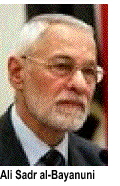 In
January, 2009 during the Israeli-Gaza conflict, there were meetings held
between Bashir Assad and several Sunni religious leaders including
Sheik Yusaf al-Qaradawi which seemed to indicate a rapprochement
between Syria's secular government and the Muslim Brotherhood.
In
January, 2009 during the Israeli-Gaza conflict, there were meetings held
between Bashir Assad and several Sunni religious leaders including
Sheik Yusaf al-Qaradawi which seemed to indicate a rapprochement
between Syria's secular government and the Muslim Brotherhood.
While Assad and most of the world thought there had been a major philosophical shift in the Ikhwan's position on Assad over a more threatening enemy—Israel, that was not what was happening. The Muslim Brotherhood wasn't strong enough to overthrow Assad. The Ikhwan negotiated a truce with Assad's Baath Party where Muslim Brotherhood leaders would be allowed to return to Syria and reside there not only as Syrian citizens, but as a political-theological movement.
On Jan. 30, 2011, a Facebook
subscriber in the Mideast posted this Facebook entry: "After Friday
prayers, 4 / February is the first day of anger for the Syrian people
proud. Comprehensive civil disobedience in all cities, all."
At 9:22 p.m. on the same day,
a Facebook member using the English screen name of Coffinman, responded:
"In 2 days, 5,400+ people have joined this Facebook group dedicated
to overthrowing the regime of Syrian despot Bashir al-Assad. 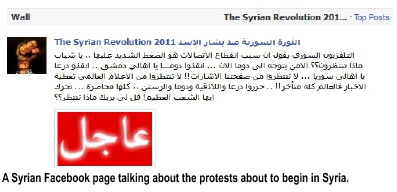 As
you know, I hope, this is how Tunis and Egypt's uprisings began as well.
Spread the word! Like the Facebook group. Support the Syrian people by
getting the word out. The Assad regime in Damascus is the next
domino to fall. On a sidenote, there were demonstrations by Sudanese today
as well. Feb. 12 will bring mass protests to Algeria 'dedicated to overthrowing
the government and ending the 19-year state of emergency.' There is a
general strike tomorrow in Tunisia against the RCD Party and the interim
government."
As
you know, I hope, this is how Tunis and Egypt's uprisings began as well.
Spread the word! Like the Facebook group. Support the Syrian people by
getting the word out. The Assad regime in Damascus is the next
domino to fall. On a sidenote, there were demonstrations by Sudanese today
as well. Feb. 12 will bring mass protests to Algeria 'dedicated to overthrowing
the government and ending the 19-year state of emergency.' There is a
general strike tomorrow in Tunisia against the RCD Party and the interim
government."
The Syrian Day of Anger did take place on Friday, Feb. 4. The protesters, again using Facebook, called for a Day of Rage on Saturday, Feb. 5 in Damascus. One Facebook page, joined by 2,500 supporters, called for an end of Assad corruption, and demanded that the Syrian Parliament bring an end to the 60-year old "state of emergency" that granted Assad dictatorial powers. On Jan. 30, Coffinman predicted demonstrations in the Sudan on Feb. 12 The public protests actually took place a day earlier to celebrate Hosni Mubarak's resignation. On February 12, thousands ignored police warnings and took to the streets in Algiers. Algerian President Abdelaziz Bouteflika deployed what the Washington Times reported as 26,000 riot police to stop an estimated 10,000 protesters. Algerian officials reported that only about 1,500 protesters turned out for the rally.
The most successful use of social websites like Facebook and Twitter to date has been accomplished by the Muslim Brotherhood. They used Facebook and Twitter to plan and topple several Mideast governments in less than 90 days, and are now attacking several other. What they accomplished shows why every truly democratic parliamentarian countries on Earth have enacted, or are in process of enacting, legislation that will allow them, in times of declared national emergencies, to exercise the Internet kill switch that each of them already possesses, and completely block all of the onramps to the Information Superhighway; or, to selectively shutdown every portal or ISP being used by destructive factions, like the Muslim Brotherhood is currently doing in the Mideast, determined to who are determined to upset the balance of power in the world and, like most underdogs in the age old struggle to conquer the world, use whatever weapons they find to create chaos since it is only through chaos that radical change happens.
The question the world should be asking about the Muslim countries whose governments are being toppled one after another like dominos by the Muslim Brotherhood, should not be whether or not the citizens of those countries are going to win freedom since they are not. Rather, they should be asking why has the world's media downplayed the Muslim Brotherhood's role in the lightning fast coups? Second, since most people know very little, if anything, about the Muslim Brotherhood, they should be asking who they are, and where their power comes from? And, finally, they should be asking what is their objective?
The Muslim Brotherhood, also called the Muslim Brethren (Jamiat al-Ikhwan al-muslimun) or, more literally, the Society of Muslim Brothers is one of the first Muslim groups to totally politicize Islam. They oppose all secular tendencies in all Islamic nations and flatly reject all Western influences in Muslim lands. The motto of the Ikhwan is: "Allah is our objective. The Prophet is our leader. Qur'an is our law. Jihad is our way. Dying [for] Allah is our highest hope." But, we're getting ahead of ourselves.
The
Birth of the Brotherhood
The founder of the
Muslim Brotherhood was a school teacher named Hasan al-Banna. Born
into a poor Muslim family in southern Egypt on Oct. 14, 1906, al-Banna
was attracted to radical extremism at an early age. He was hostile to
the political system of the West with all of its inherent rights—particularly
those for women. 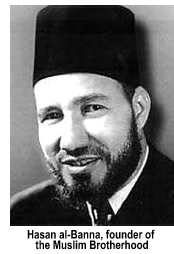 The
Muslim Brotherhood was the very first Islamic fundamentalist movement
in the world. It came on the heels of the fall of the Ottoman Empire.
While still in his teens, al-Banna began recruiting adherents from
among his friends and acquaintances. They called each other the "brethren,"
and argued about what was both good and bad about the Arab society, and
to mourn the decline of Islam which they blamed on the collapse of the
Ottoman Empire and the curse of oil—and the bankers and industrialists
in the West.
The
Muslim Brotherhood was the very first Islamic fundamentalist movement
in the world. It came on the heels of the fall of the Ottoman Empire.
While still in his teens, al-Banna began recruiting adherents from
among his friends and acquaintances. They called each other the "brethren,"
and argued about what was both good and bad about the Arab society, and
to mourn the decline of Islam which they blamed on the collapse of the
Ottoman Empire and the curse of oil—and the bankers and industrialists
in the West.
As the West increasingly intruded into the Muslim world in their quest for black gold, al-Banna began speaking out in inflammatory speeches against colonialism, Arab nationalism and the weakness of the Muslims in the post-Ottoman world. He preached the anti-capitalist doctrines of Stalin Marxism and Hitler fascism. Preaching Islamic revivalism al-Banna shared his vision of restoring the Caliphate—a dream he knew could only happen by the sword. Al-Banna produced a booklet called "The Way of Jihad" in the early 1930s. In this document, al-Banna begins by saying: "Jihad is an obligation from Allah on every Muslim and cannot be ignored nor evaded. Allah has ascribed great importance to jihad and has made the reward of the martyrs and fighters in his way a splendid one. Only those who have acted similarly and who have modeled themselves upon the martyrs in their performance of jihad can join in this reward..."
As al-Banna's anti-west, jihadic rhetoric became more virulent, his followers multiplied and he became Imam al-Banna, preaching inflammatory hatred against Arab heretics and the need for Muslims to return to their purest roots, reestablish the Caliphate and re-ignite the great and final holy war—the final jihad—against the non-Muslim world. The first step towards that international jihad came in the form of terrorism against the Jews in Palestine during what is known as The Great Arab Revolt of 1936-1939 when one of the most powerful Muslim Brotherhood leaders, the Hajj Amin al-Husseini, the Grand Mufti (supreme religious leader) of Jerusalem incited his followers to slaughter both the Jews living in Palestine and the British military which administered the Balfour Declaration (the 1922 British Mandate for Palestine). When the Great Arab Revolt commenced in 1936, the Brotherhood had about 800 members. In 1938—2 years into the revolt—its membership had grown to close to 200 thousand.
The underground network of the Brotherhood had become so powerful that they had secret assassination squads and sleeper cells of subversive martyrs-in-waiting who awaited orders to carry out forms of terrorism, assassinations and, when needed, suicide missions. The Brotherhood recruited their many of their followers from the ranks of the Egyptian Army, the police and even administrative functionaries from the government.
The
Brotherhood's Not Exactly Soulmate
In 1936 al-Banna
forged a political and military alliance that worked for him. It was a
political protocol with Nazi Germany. While al-Banna and Adolph
Hitler were not exactly soulmates, the arrangement brokered by al-Banna
was far more than just a marriage of convenience. Both al-Banna
and Hitler were bent on world conquest. Both wanted to completely
subjugate and dominate every living soul on Earth. Both were supremacists.
And, most of all, both hated the Jews. Both believe in transnationalization
and the eradication of the nation-state (as does the New World Order today).
In Hitler's vision of the future, he was the leader—the Fuhrer
(the Father) of the world. In al-Banna's vision, he would be the
Caliph. Perhaps the 12th Caliph, whom the Muslim prophecies say will rule
the whole world from Jerusalem. They were soulmates paired in Hell. The
parallels between them facilitated the alliance of convenience. Both knew
that the day would come when one would subjugate the other. Both were
convinced they would prevail.
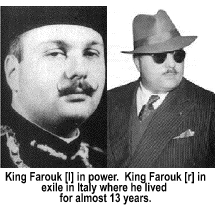 During
World War II the Muslim Brotherhood formatted a formal alliance with the
Nazis, urging Berlin to help him depose Egypt's King Farouk. In
exchange, the Brotherhood would aid the Nazis with real time intelligence
from Brotherhood members within the government, and supply the Nazis with
dossiers on the key members of Farouk's government. Al-Banna
supplied far more to the Germans than he got in return. At war's end,
Farouk was still alive. He was deposed by the Muslim Brotherhood
in 1952, and surrendered his throne to his infant son, Ahmed Fuad,
who became King Fuad II. Farouk died in exile in Italy on
March 18, 1965.
During
World War II the Muslim Brotherhood formatted a formal alliance with the
Nazis, urging Berlin to help him depose Egypt's King Farouk. In
exchange, the Brotherhood would aid the Nazis with real time intelligence
from Brotherhood members within the government, and supply the Nazis with
dossiers on the key members of Farouk's government. Al-Banna
supplied far more to the Germans than he got in return. At war's end,
Farouk was still alive. He was deposed by the Muslim Brotherhood
in 1952, and surrendered his throne to his infant son, Ahmed Fuad,
who became King Fuad II. Farouk died in exile in Italy on
March 18, 1965.
In 1948, when the United Nations voted to reestablish the State of Israel which had not existed since 586 BC—or for 2,534 years, al Banna and Amin al-Husseini urged the Arab world to unite in opposition to the resolution. (Some would claim the actual demise of Israel came in 333 BC when Alexander the Great defeated Persia and conquered Judea. When Alexander died, his kingdom was divided into four Empires, with Judea becoming part of the Seleucid Empire. If 2,281 years fits your chronology, so be it. Anyway you count it, Israel was not Israel for a long time. The prophecy of its rebirth is found in Ezekiel 37:1-14. So whether you add or subtract the additional 253 years from someone's historic yardstick, no ancient land has been reborn in current times.)
The resolution to create the State of Israel would have also created the State of Palestine. But finding a home for the gypsy Palestinians (whose ancestors were the offspring of unions between Syrians and Jews and Persians and the Jews who were left behind during the Assyrian and Babylonian captivities) was not a simple task. No Arab wants them as a neighbor. Nor do the Jews. While the Palestinians are ancestral Muslims, they are no one's friends and everyone's terrorist pawns in the Mideast.) Over the centuries, you might say, the Jewish blood that coursed through their veins was adequately diluted with Arab blood, but that Jewish blood still remains as a stain on their Islamic identities.
With their influence in Egypt rising, and with the Egyptian government uncovering a plot by the Muslim Brotherhood to assassinate several members of the Egyptian government, Prime Minister Mahmoud an-Nukrashi Pasha outlawed the group in December, 1948 and seized all of its assets. Several Brotherhood members were rounded up and jailed.
In January, 1949—less than three weeks after the Brotherhood was disbanded—Pasha was assassinated. On February 12, al-Banna was also shot and killed by an assassin (whom the Brotherhood believed was a government agent or military officer) The Ikhwan's second leader, Isam al-Attar was less prone to violence than al-Banna, and rejected violence in the struggle to prevent Saddam Hussein's Baath Party from seizing power in Iraq. By contrast, most of the senior Brotherhood leaders and most of the young activists who saw an armed struggle and terrorism as the only strategy that would help them achieve their objective—world subjugation. In the end, the more militant faction, headed by Abd al-Fatah abu-Ghuda won out and al-Attar was deposed. A new, and more violent generation of radical Islamists took over the movement. Most were students of the radical Wahabbi teachings of Sayyid Qutb, whose teaching argued that governments which fail to incorporate Sharia into all aspects of life are heretical and, that government, is illegitimate and most be overthrown.
The
Brotherhood in Syria
In the 1940s the Muslim Brotherhood flourished in Syria thanks to the
French Foreign Legion. Various Islamic groups formed under the rubric
of the Muslim Brothers (al-Ikhwan al-Muslimun), making Syria the first
nation after Egypt where the seeds of the Ikhwan movement were planted.
Mustafa al-Siba'i led the Syrian armed struggle against the French.
In 1946 the French left. Between 1946 and the Ba'ath coup in 1963 that
brought Hafiz al-Assad to power, the Syrian Ikhwan was a part of the political
system, increasing its seats in Parliament from 2.6% in 1949 to 5.7% in
1961.
In 1980, Hafiz Assad's parliament enacted Law No. 49 which mandated the death penalty for members of the Ikhwan. At the same time, the Ikhwan joined forces with other opposition groups in Syria—including Kurds—who were determined to overthrow the current regime.
This is something those studying the Muslim Brotherhood should note. The Ikhwan does not hesitate to forge alliances with anyone who wants to destroy their enemy. The adage, "the enemy of my enemy is my friend," fits the Ikhwan since it will not hesitate to forge alliances with those with whom it differs—even ideologically—if that alliance will help them destroy a stronger enemy. Once the stronger enemy is defeated, it can then deal with the no-longer-needed ally. That is why, in 2006, the Muslim Brotherhood joined the National Salvation Front, which is determined to end the regime of Bashir Assad. And why, in 2009, it broke with the NSF and met with Assad, convincing him that they were no longer part of the group attempting to overthrow him. The ideological shift and what the media called a "historic reconciliation" with the Assad regime was simply a ploy to reestablish themselves in Syria. It worked.
End
game.
The world is now seeing the results of those alliances. What does not
show, in public, are the fingerprints of the Muslim Brotherhood. In fact,
the Muslim Brotherhood is now deeply rooted in 80 countries—that's
about 43% of all the nations on Earth. When they conquer the Muslim nations,
the non-Muslim nations will be next. We are watching the opening plays
in the Muslim Brotherhood's end game. It's hard to see them manipulate
the game since they are smart enough to work in the dark in order to make
sure their presence, and their identity is not front and center. The world
watched the Muslim Brotherhood toppled the governments of Tunisia and
Egypt. And, it will topple the governments of Syria and Libya. And, the
mainstream media will continue to call it a "freedom movement."
And what is even worse, the industrial nations of the world, through the
European Commission and NATO, are actually helping them gain the power
they need to force every nation on Earth to adopt Shar'ia law and convert
to Islam or suffer the consequences.
As the Muslim Brotherhood orchestrated the gameplay in the Egyptian coup, the media reported that the historic event that took place in Tahrir Square in Cairo that launched a revolution was orchestrated by college students and young professionals using the social networking sites, Facebook and Twitter that was inspired by their peers in Tunisia. So says the media. What do the people who were there, say? According to Egyptian analysts and many of the those in involved in leading the protests, the faction behind what is happening in the Mideast is the Muslim Brotherhood. Make no mistake. Although the media claims their role in this turmoil is insignificant at best. The media would also have us believe that college students orchestrated a protest and brought upwards of 70,000 from around the Mideast and from around the world, people to Tahrir Square and that it succeeded only because it caught the Mubarak regime off-guard. When the media talked to members of the Muslim Brotherhood, they were dismissive as well, saying it was slow to listen to its youth wing that a digital age revolution was taking shape.
The problem with that is
that two of the Muslim Brotherhood's best organizers—Ahmed Maher
and Mohamed Abbas—were the Muslim Brotherhood youth movement
leaders who stoked the Facebook and Twitter fires in Egypt. 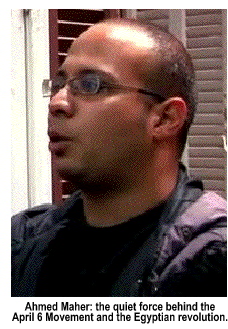 Twenty-six
year old Abbas, a Muslim Brotherhood organizer who heads a advocacy
group called the April 6 Movement (from a 2008 protest on behalf
of workers at a textile plant) berated a protester who flashed a Muslim
Brotherhood insignia to TV cameras that "...Egyptians don't want
to make this revolution into a Muslim Brotherhood show...Don't show the
ideology to the press because it's bad for the revolution."
Twenty-six
year old Abbas, a Muslim Brotherhood organizer who heads a advocacy
group called the April 6 Movement (from a 2008 protest on behalf
of workers at a textile plant) berated a protester who flashed a Muslim
Brotherhood insignia to TV cameras that "...Egyptians don't want
to make this revolution into a Muslim Brotherhood show...Don't show the
ideology to the press because it's bad for the revolution."
Ahmed Abdel-Rahman, a 21-year old law student who joined the "revolution" on Jan. 25 when he saw a notice on Facebook to meet at Tahrir Square in Cairo. He did. It did not take him long to realize that the student protest he thought he was joining turned into a very serious, and very deadly antigovernment protest. He said he felt like "...the Brotherhood was taking over." To the reporter he was confiding in, he admitted: "I was afraid." This had the appearance of being a spontaneous protest of 70 to 80,000 people only because the ugly antigovernment, anti-American signs never came out. Nor did the familiar green Ikhwan insignia with the Qur'an and crossed swords.
The coordinator of the Cairo protest was another Muslim Brotherhood member, Ahmed Maher a 30-year old tech-savvy civil engineer who has been jailed five times in Egypt for protesting against the government.. One of the questions the media never asked about the videos the youth groups supposedly "found" and displayed to show Egyptians how brutal the police were in interrogating their citizens. Since there is no "freedom of information act" in Egypt, the videos, which are police footage, were never in the public domain. It was this information, the media people said, which ignited a revolution. The media said, "It just wasn't a student-led revolution; it wasn't just the middle class. It happened all across Egypt." Clearly, the people did not know they were being led. Nor, it seems, did the media. The people on the ground did. The Muslim Brotherhood, or simply, "The Brothers" did.
The Muslim Brotherhood website,
Ikhwanweb.com, published an article on April 2, 2011 in which Ohio State
University's Moritz College of Law, President's Club Professor of Law
John B. Quigley was quoted in the Bellingham Herald as saying:
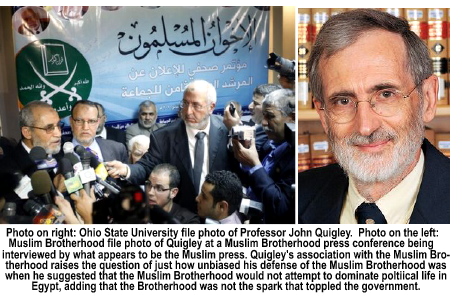 "The
Muslim Brotherhood is no threat to democratic development in Egypt. The
Brotherhood is a well-organized movement in Egypt, but it was not the
spark for the protests that led to the recent change in government."
Further in the article, Quigley asks, and answers the question:
"Will the Muslim Brotherhood become a larger threat? No/" Huh? Okay...since he is no longer believable, just who is John
Quigley? Aside, from the fact that I don't personally find him to
be a credible, unbiased analyst of the events transpiring in the Mideast
since he is the guy being interviewed to the backdrop of the Muslim Brotherhood
insignia. I have far have more questions about Professor Quigley
than I have answers. Until I understand his relationship with the Muslim
Brotherhood, I can't to take his answers seriously. Particularly since
the turmoil in the Mideast is being orchestrated by the Muslim Brotherhood
which Quigley maintains did not even cause a spark to ignite
the rebellions in the Mideast.
"The
Muslim Brotherhood is no threat to democratic development in Egypt. The
Brotherhood is a well-organized movement in Egypt, but it was not the
spark for the protests that led to the recent change in government."
Further in the article, Quigley asks, and answers the question:
"Will the Muslim Brotherhood become a larger threat? No/" Huh? Okay...since he is no longer believable, just who is John
Quigley? Aside, from the fact that I don't personally find him to
be a credible, unbiased analyst of the events transpiring in the Mideast
since he is the guy being interviewed to the backdrop of the Muslim Brotherhood
insignia. I have far have more questions about Professor Quigley
than I have answers. Until I understand his relationship with the Muslim
Brotherhood, I can't to take his answers seriously. Particularly since
the turmoil in the Mideast is being orchestrated by the Muslim Brotherhood
which Quigley maintains did not even cause a spark to ignite
the rebellions in the Mideast.
Prior to going to Ohio State University, Quigley was a research scholar at Moscow State University and a research associate at Harvard. At Ohio State Quigley teaches international law and comparative law. He also holds an adjunct appointment in the Political Science department. In 1982-83 he was a visiting professor at the University of Dar es Salaam in Tanzania. Among the 11 books Quigley authored are: The Case for Palestine; The Ruses for War; American Interventionalism Since WWII; Palestine and Israel: A Challenge to Justice; Law After Revolution; and in the Florida Law Review: "Identifying the Origins of Anti-American Terrorism," subtitled: To Combat Terrorism, US Must Re-examine Foreign Policy.
Academia in the United States has had its head buried in the sand since the end of World War II when the world's wealthiest foundations began financing their Chairs and influencing their curriculum. Academia championed the creation of the United Nations and loves the prospects of world government. Today the Muslim world appears to have joined the globalists who will eagerly force Sharia Law on the people of world—and call the price tag cheap even though the ultimate price tag is the global loss of liberty and the adoption of an archaic legal code as inhumane and frightening as terrorism itself.

Copyright © 2011 •Jon Christian Ryter.
All rights reserved.


